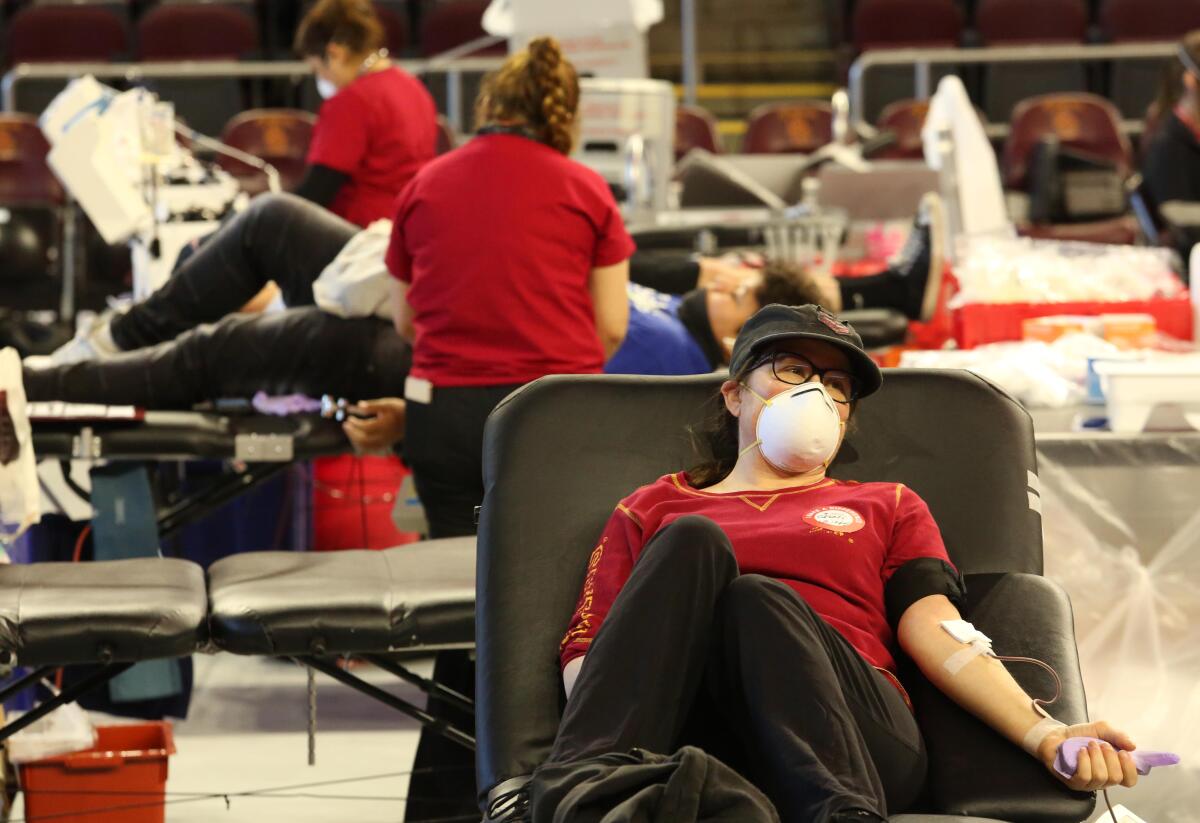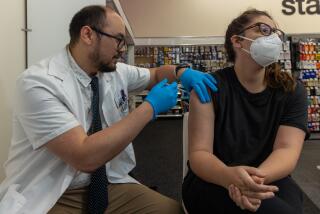The Red Cross says there’s a national blood shortage. Here’s how to donate

- Share via
The Red Cross is currently experiencing what it’s calling “the worst blood shortage in over a decade.”
Always in need of blood, the nonprofit said that the combination of the relentless pandemic and an unusual flu season have exacerbated the preexisting shortage. Overall donations have dropped 10% since March 2020. Students once accounted for 25% of annual donors, but with most on-campus drives canceled, their contribution has fallen by 60%.
Almost every two seconds, a patient in the United States needs a blood transfusion, according to Dr. Ross Herron, divisional chief medical officer for the American Red Cross. With COVID cases and hospitalization rates rising, blood donations are needed now more than ever.
Blood and platelets can be used for a variety of treatments and can be the difference between life and death. Here’s how you can help.
What kind of blood is needed?
The Red Cross is in need of all blood types year-round, Herron said, as well as platelets and plasma.
Type O-negative, the so-called “universal” blood type, is always in high demand and often short supply, given that only about 7% of the population has it, he said.
For plasma donations, people with type AB blood are highly encouraged to donate. Those who have types O, A-negative and B-negative are encouraged to make what’s called a Power Red donation, where a concentrated dose of red blood cells is collected while most of the plasma and platelets are returned to the donor.
How to donate
Donating usually takes less than an hour, and you get to walk away knowing you helped someone. There are also usually free snacks offered afterwards.
The process is fairly simple. Show up for your appointment and register your information, answer some questions about your medical and personal history, and then ready yourself for the needle. After that, you’re on your way.
To promote social distancing, donations are by appointment only. All donors must wear a mask when at the donation site, regardless of their vaccination status. The Red Cross says it implements social distancing practices at all points in the donation process, including the donor beds.
You can schedule your appointment by visiting RedCrossBlood.org, downloading the Donor App or calling 1-800-RED CROSS. Or you can find your local center. For Angelenos, the Red Cross Greater Los Angeles Chapter Blood Donation Center in West Hollywood is open on the first Monday, second, forth and fifth Thursday and every Saturday of the month.
Why should you donate?
The Red Cross estimates that each blood donation saves the lives of three people.
Blood can be used to treat a wide range of medical needs, such as reintroducing platelets into cancer patients’ bodies or providing antibodies for those being hospitalized because of COVID-19.
The shelf life of blood is short, so a constant stream of donations helps ensure there will be enough supply on hand.
You can donate blood every eight weeks and make a Power Red donation every 16 weeks.
Who’s eligible to donate blood?
The Red Cross says that to donate, you must:
- Weigh at least 110 pounds
- Be 17 years old (or 16 with custodial consent)
- If you are a student or a minor, be at least 5 feet tall if you’re male or 5 feet 6 inches tall if you’re female.
Because blood volume is determined by height and weight, those who don’t meet these requirements may not be able to deal with the loss of blood that comes with the collection. There is no upper weight limit as long as the donation space can accommodate you.
There are many reasons why you may not be able to donate blood. Some include:
- You have a fever, are feeling ill or are taking antibiotics at the time of donation
- Your medication requires a waiting period after your last dose before donating
- You were just vaccinated for smallpox; mumps, measles and rubella; or hepatitis
- You’ve tested positive for COVID in the past 14 days or have COVID symptoms
- You’ve recently traveled outside of the U.S. or Canada
- You have medical conditions, such as hemophilia, certain types of cancer, HIV/AIDS or any other active infections
- You are a man who’s had sex with another man within the past three months
- You are pregnant
If you are unable to donate for any reason, the Red Cross encourages you to volunteer or host your own blood drive.







